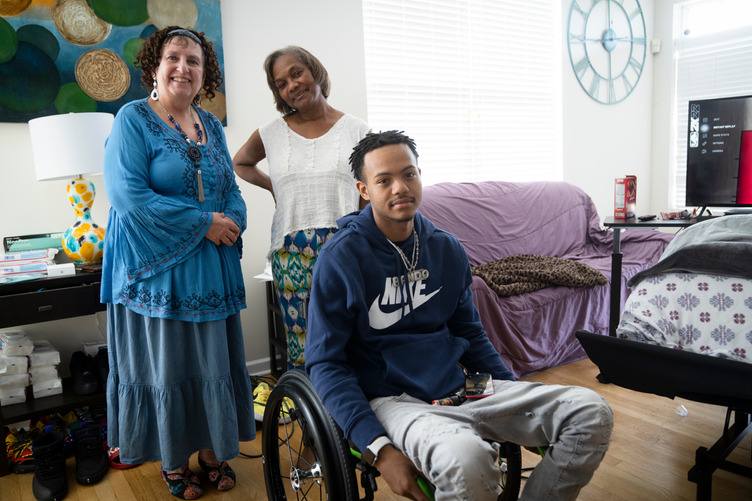
The entire family dynamic shifts when a child (no matter their age) acquires a spinal cord injury (SCI). For parents, the experience is often sudden, layered with grief, and filled with uncertainty and many unanswered questions. But it can also reveal new skills, deeper resilience, and a strengthened bond between parent and child.
Alongside navigating the shock of the injury, they may find themselves in unfamiliar medical systems, advocating for care, and managing insurance challenges—all while trying to process what this new reality means for their loved one’s future. Through it all, many parents find strength they didn’t know they had, and find moments of clarity, connection, and hope that help guide the path forward.
This article explores the experiences of parents whose children, whether minors or adults, have sustained SCIs. It highlights how their roles evolve over time and how the SCI community, healthcare professionals, and researchers are working to better support families. Our grantee partners contribute to this effort through innovative community programs, healthcare improvements, and research initiatives that prioritize the physical and mental wellbeing of families alongside individuals with SCI.
Community Support
Parents often serve as primary caregivers, advocates, and emotional anchors after the injury; but they also face their own trauma and a need for support. One of the most meaningful sources of connection can come from a peer network, such as other parents who have navigated similar experiences and can offer guidance, validation, and hope.
At a rehabilitation hospital supported through our Creating Opportunity & Independence portfolio, a newly developed patient and family center offers space for families to gather outside of therapy hours. The center provides a flexible environment to try out adapted games, engage in creative activities, and connect with others. It also serves as a place for recreation therapists to help patients practice skills before returning to community settings.
“The new area will decrease the social isolation many patients with spinal cord injuries often feel and give them a sense of normalcy while interacting with other patients with spinal cord injuries,” shared one team member involved in the program. Designed to support both patients and families, the space also encourages meaningful leisure time during inpatient rehab, helps build confidence with adaptive tools, and reflects the diverse cultural and geographic backgrounds of those served. Plans to include individuals with SCI as mentors add another layer of support, modeling community participation and offering insight from personal experience.
Navigating Healthcare Challenges
Managing the healthcare system after an SCI often centers on the individual, but parents play a critical role in an individual’s recovery and ability to integrate into their new normal. As caregivers, parents help with discharge planning, medications, therapy coordination, and day-to-day personal care. Yet many rehab centers don’t provide enough training or support to help them prepare for this role.
Insights from Neilsen Foundation-supported psychosocial studies highlight the need for better caregiver preparation. Many parents report feeling overwhelmed during their child’s transition home, unsure of how to provide safe physical care, and anxious about handling medical needs or related health issues.
Several practices are being explored that may help caregivers feel more prepared:
- Begin caregiver education and support early in the rehabilitation process
- Offer personalized training and emotional check-ins
- Share practical resources, such as caregiver-specific guides or online tools
Implementing tools that recognize parents not just as family members, but as care partners, can ease stress and support recovery.
Research and Technology
New research is examining how caregiving affects parents’ emotional and physical health over time. One grantee partner studied the experience of parents whose children sustained an SCI, finding frequent feelings of isolation, mental and physical fatigue, as well as limited support at the start of this new role. At the same time, many parents expressed a deepened sense of purpose and connection as they adapted to their new responsibilities.
Other researchers are developing tools and strategies to support caregivers. A grantee partner in Chicago piloted a multi-year support program for caregivers of children with SCI, which included a weekend-long in-person Parent Forum, monthly support calls with a mental health professional, and a follow-up event the next year. One parent reflected, “It’s been something that, honestly, I looked forward [to] because, for me, it’s a relief to be around people who get what I’m going through.” These connections helped caregivers feel more confident and less alone—especially for those who didn’t know anyone else raising a child with an SCI. New telehealth approaches and caregiver apps are also being tested to better serve families in rural areas without easy access to specialists.
This growing body of work reinforces an important message: when parents are supported, the entire care system improves. A more inclusive approach to SCI recovery means addressing the needs of families, not just individuals. When parents are empowered with knowledge and coping skills, families can move forward together. As community programs, healthcare, and researchers continue to learn from and support parents, we are building a more supportive and inclusive path for SCI recovery. This approach recognizes that healing is a shared journey.